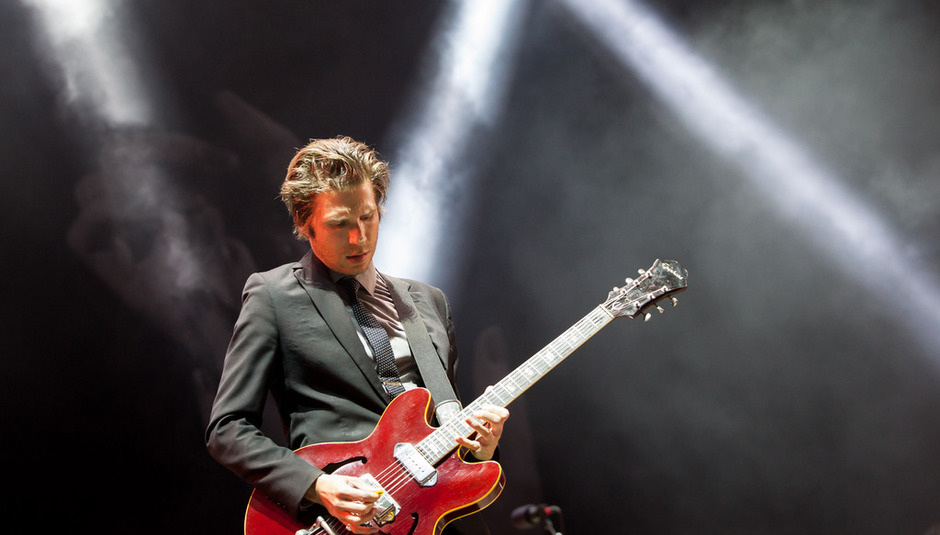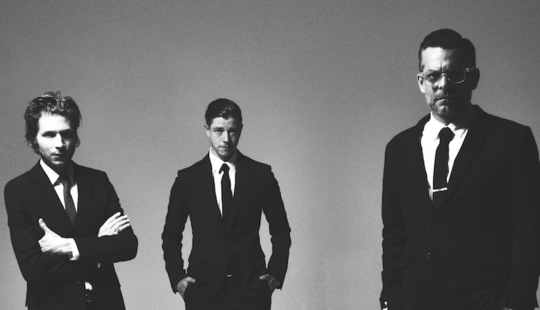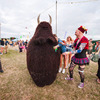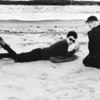Interpol release their eagerly anticipated fifth long player El Pintor in September, so when DiS was recently offered half an hour of guitarist Daniel Kessler's time we duly accepted. Here, Kessler discusses the making of the new album, festivals, playing live and tenth anniversaries...
DiS: You're currently in the middle of a very busy live schedule that runs through to the end of November, give or take a few weeks here and there. You're also playing a lot of festivals this summer. Was that a conscious move to hopefully play to new audiences?
Daniel Kessler: No. I think it's just a timing thing really. We finished the record during the first week of February. And then you have choices. For a while we tried to get the record out in May. Then we decided not to rush things and take our time. So now it's coming out in September. In the meantime, what do you do? It makes sense for us to come back in this way and I really like playing festivals. The unpredictability of not knowing what the stage looks like, whether we'll get a soundcheck or even if the set time might change. Some days we might get an hour, others maybe an hour-and-a-half. Then we may go at 1:30 in the morning, another night it might be 8pm. I like all that. Plus we get to see a different country almost every day. It speaks to me. It's not monotonous.
DiS: Glastonbury the other week was certainly very unpredictable, with the electrical storms causing the stages to be closed and many set times to be altered, including yours. Did it feel like a special occasion to be playing that festival?
Daniel Kessler: I think Glastonbury's one of those festivals you should always look forward to playing. No matter what the weather's like, whether it's pissing down with rain or whatever. You should really try and make the most of however long your set is. It's something to take in. We hadn't played Glastonbury in ten years. It's a storied festival. Everyone knows what Glastonbury means to them. It's an experience you don't want to see go by in the blink of an eye. You want to have your eyes open and be a part of it. Be very present.
DiS: Tonight is your first time playing Optimus Alive. What kind of response are you expecting? What kind of response do you normally get from Portuguese audiences?
Daniel Kessler: I think we have a really lovely following here in Portugal. We've always played great concerts and the fans are really passionate. Lisbon's a beautiful city. It's a beautiful part of the world and if you start out touring here you'll end up touring here. We always make an effort to come and play here. I just really love the place.
DiS: The setlists on this tour are very heavy with material from Turn On The Bright Lights and Antics rather than your most recent two records. Are there any songs or albums from the band's back catalogue you're not so fond of playing any more?
Daniel Kessler: No. You have to think the last time we went out on tour was for the previous record (Interpol) so we played a good deal of that album for over a year. When you have five records it gets more complicated. Even though the fifth record's not out yet we've still been playing three songs off it most nights. Glastonbury was probably the only show where we didn't play all three because the set time was reduced because of the storm. We never play too many new songs because it might go over the audience's heads and they'll go to the bar or wherever instead. It's nice for us to be able to mix the newer songs with some of the older stuff. When I'm looking back at setlists I usually overlook whether it's more heavy on Turn On The Bright Lights or Antics material and less heavy on other songs. I don't want us to be that kind of band where everyone just wants to hear the first record. Particularly when you might feel duty bound to play a song everybody wants to hear but we don't really want to play. When you're playing a show it should be present and meaningful to the people that want to be there. So why not lump it all in together? It's our way of saying, "This is us right now."
DiS: On a personal note I'd like to hear you play 'The Lighthouse' from Our Love To Admire again.
Daniel Kessler: And we will. I guess you could say the current set is geared towards festivals, not that we specifically put sets together for that reason. But if it was one of our own headlining shows we'd definitely mix things up a bit more. Because it's different every single day, we have a setlist that fits in with that kinda thing. 'The Lighthouse' is one of those songs that's not really made for festivals. I love 'The Lighthouse' too. I'm not one for choosing favourites but if I had to that would definitely be up there.
DiS: Your fifth album El Pintor is released in September. How long did it take to make the record?
Daniel Kessler: To be honest it didn't take that long. Primarily, I started writing songs around 2012, maybe a little before that even while we were still on tour. We toured until November 2011 and played over 200 shows in total. Then I started working on some new songs in 2012 while Paul (Banks) and Sam (Fogarino) released their other projects. Paul and I got together for five days in August 2012, and then Sam came down for three days and it felt good. But then we didn't get together again until January 2013. So we wrote and recorded the entire record in 2013. Even then, we weren't always working Monday through to Friday because Sam was living in Europe so we had to schedule sessions around that and be really productive when we were together. I didn't know it was going to be this way but it really worked out. I think the songs were providing a lot of energy. Somehow, we managed to put the whole thing together in one year which is fast for us, then in January of this year Alan Moulder did the final mixes.
DiS: You also worked with Alan Moulder on your previous album. What made you choose him again? Are you a fan of his other works with the likes of Nine Inch Nails, My Bloody Valentine, Curve and Swervedriver?
Daniel Kessler: The reason we wanted to go back to him after he mixed our last record was that although we always intended to produce this record ourselves, he still brings a lot of good ideas with him. We really enjoyed working with him last time. He's also not just an established name, but someone that actually works hard on your music. He's not one of those that just does five hours here and there. Some days he'll work forty-eight hours straight through if he's trying to lay down a particular track. He actually listens to our music and what we have to say. He's not there to try and change everything. He's there to enhance it. Working with him on the fourth record was such a wonderful experience that he was always going to be first choice on this one. Plus he's also a great dude when you're in the studio hanging out. Some people are always gonna be, "I don't like this person" or whatever. Yet we spent aeons in this situation with this one individual and all came out of it regarding Alan as one of our favourite people in the world. I really think of him as a good friend. Consequently, all the songs sound like Interpol songs but enhanced in a way only Alan can do.
DiS: The songs on the new record seem much more direct than those on its predecessor. More accessible even.
Daniel Kessler: They weren't planned like that. It's just the way they came out. For me, after we've put out record that sounds a certain way, there's usually a good chance the next one will be quite different. So if the fourth record was written in an atmospheric way, this one would always go another way. I couldn't predict how it was going to happen. I know if I say I'm going to do something in a certain way I'll end up failing miserably. It would just feel contrived and too full of intent. And it's not that easy to do. In my experience, direct songs are harder to write than more experimental pieces. I think I was just in the mood to do that and the songs on El Pintor are just what came out. We just put a lot of urgency into them. We attacked them the way we did, but certainly didn't talk about it. It wasn't until we finished the record that we realised it was much more direct than the previous. Once the drums kick in on the first track 'All The Rage Back Home', the album doesn't really relent until the last song 'Twice As Hard' which is the slowest track on the record. That's what came out and that's what it is. When you're a little bit into your career you can look back and say, "That's what we did in 2013." That's Interpol now. Who knows where we'll be when we make our next record?
DiS: When you toured the UK in March you were playing three or four of the new songs every night, so I guess you must have been confident how good the songs were back then? Were you taken aback at the unanimously positive reaction from both audience members and critics too?
Daniel Kessler: I always worry that the audience will head to the bar en masse when we play a new song, because that's what I used to do when I was a kid! So I wasn't really expecting anything. That people were bobbing their heads and getting into it, anything above just staring - which there's nothing wrong with because you're having a listen - was great. I was prepared for anything.
DiS: El Pintor has ten songs plus 'The Depths' which features on the bonus edition. Are the any more songs lying around which didn't quite make the record? Will they be released or reworked in the future?
Daniel Kessler: Originally, we had fourteen songs but I knew I really wanted ten on the record. Even with Turn On The Bright Lights I only wanted ten on that record but it ended up being eleven because we couldn't decide which one to leave out. I like the idea of it being ten songs and you've said enough. There isn't a single song on this record that I would say shouldn't be on the record. Choosing what to put on the album is always the hardest part, but then people also tell me it's a great problem to have! Nothing here was written as a b-side. They're all contenders. So yeah, the three songs that didn't quite make this record will come out at some point. They're equally important, but just didn't fit into this body of songs right now. And the good thing about living in this day and age is anyone that wants to hear them will have the opportunity to do so when we put them out.
DiS: Can I ask why 'Specialist' never made it onto the first album?
Daniel Kessler: Probably because of what I just said! It's not because we think it's any less a song than the rest of that album. But it is stupidly long compared to most of Turn On The Bright Lights. And I've always been in love with records that you want to hear from start to finish and then repeat again as soon as you get to the end. Before the age of social media where people just select individual tracks, you'd always make a conscious effort to listen to an album in full. Nowadays, people don't even know the names of the songs they're listening to and it's wrong. Here's track twelve or thirteen or whatever.
DiS: Paul Banks plays bass on the album although Brad Truax is still the bassist for live shows. Will Brad become a permanent member in the future or are Interpol now technically a three-piece?
Daniel Kessler: Interpol is just the three of us. Truthfully, that wasn't scripted until it happened. When Paul and I first together he asked if he could play bass because he tended to sing vocal lines that are bass lines. He always has. So that's what happened before we even had a discussion about how we were going to record the bass. It started quite early on when we worked together on a couple of songs that I'd already arranged ('My Desire' and 'Anywhere') and Paul really laid the foundations for the vocal line and the bass line, some of the vocal melody and some of the lyrics. That's how those two songs emerged, so I think once that had started working so well we decided to continue, even though we still kept an open mind as to how we'd go about recording the bass for the rest of the album. Paul was writing basslines, but again that wasn't decided upon in advance it just happened so it made sense to carry on down the same road. I'm amazed by how good a bassist he is. We had to decide whether he was going to record it himself or get someone else in to play them. We were keeping our options open but by the end we all decided Paul was the best person to record them. In hindsight, it was the best decision we made because it stopped everything from being forced.
DiS: Do you see Paul writing and recording the bass parts in the future?
Daniel Kessler: Again, I don't know because if we'd had that discussion before we started making the record El Pintor may have turned out differently. I don't see why it couldn't happen again because he did a great job.
DiS: Brandon Curtis also plays keys on the album which is the first time he's played on an Interpol record. Will he be involved in the writing and/or recording process in future?
Daniel Kessler: I've no idea. We've a great relationship with him, he's like a brother. We admire his work as a songwriter. Obviously we're all big fans of Secret Machines. His solo work's great too, so it's an honour to have him play with us on our record.
DiS: There was a tenth anniversary edition of Turn On The Bright Lights in 2012. Will there be a similar release for Antics, which celebrates its tenth birthday in September?
Daniel Kessler: Maybe. Obviously this year it wouldn't quite make sense because we have a new record so wouldn't want to put too much out in one go. The anniversary edition of Turn On The Bright Lights really took up a lot of my energy. It took a lot of work so if I do a similar thing for Antics it will have to be done when I have enough time available. I think people appreciated it but at the same time it wasn't about us feeling the need to have to do that. Hopefully we can do something. It just won't be on the ten year mark. Maybe an off year or something.
DiS: Was there ever a point where you thought about or maybe even wanted to tour Turn On The Bright Lights in its entirety?
Daniel Kessler: I can't say I wanted to! The thought of it doesn't offend me, but as an artist you should really want to continue making great music. If the right situation came along and it was the right time to do it then maybe. We aren't one of those bands who'd ever say no to playing anything we've done. I'm proud of everything we've recorded, every record we've made. I'd play anything we've done if it felt right. Artistically you should feel that way. I never like to hear bands disown stuff. It just seems weird to me. How can you disown something you've tried to make work? And it's not just about trying to make something work. It's also about artistically expressing something you've been trying to express. If you want to express something new then fine. It's completely healthy. But I never look back at anything we've done and think, "What was I trying? Why didn't that work?"
DiS: Do you still feel as excited about making music and playing live now as you did when the band first started?
Daniel Kessler: I do. If I didn't I would stop. Or rather it would stop.
DiS: Will there be a full UK tour for El Pintor?
Daniel Kessler: This year probably not. We did the UK shows in March and then Glastonbury but next year we'll definitely come back and spend a lot of time on this record in the UK and Europe.
Interpol return to the UK in 2015 and have so far announced the following shows:-
February
6 London Roundhouse
7 London Roundhouse
8 Manchester Albert Hall
For more information on Interpol visit their official site.























